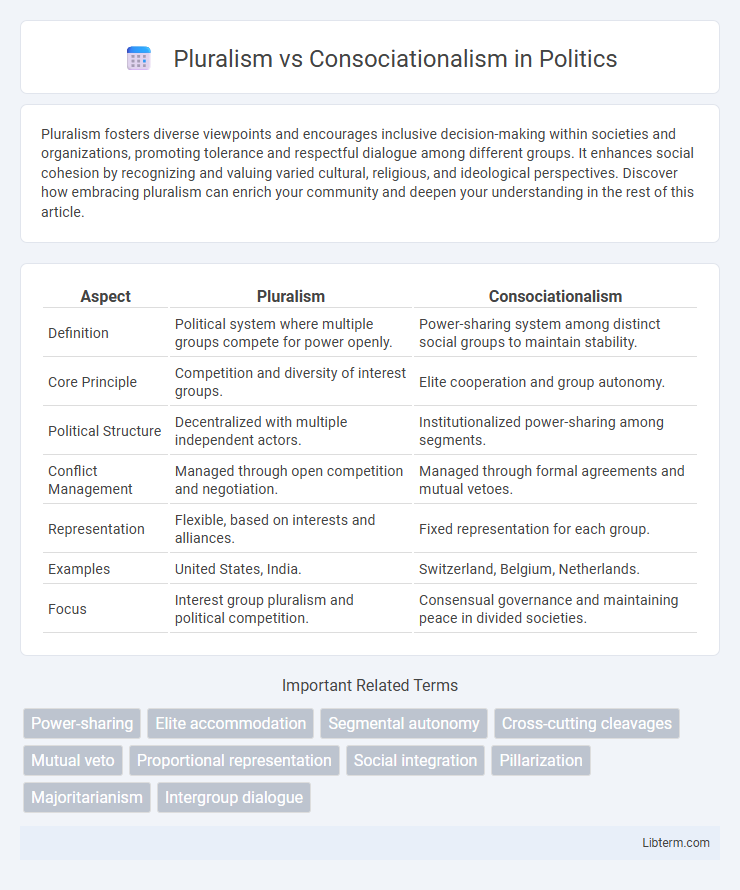Pluralism fosters diverse viewpoints and encourages inclusive decision-making within societies and organizations, promoting tolerance and respectful dialogue among different groups. It enhances social cohesion by recognizing and valuing varied cultural, religious, and ideological perspectives. Discover how embracing pluralism can enrich your community and deepen your understanding in the rest of this article.
Table of Comparison
| Aspect | Pluralism | Consociationalism |
|---|---|---|
| Definition | Political system where multiple groups compete for power openly. | Power-sharing system among distinct social groups to maintain stability. |
| Core Principle | Competition and diversity of interest groups. | Elite cooperation and group autonomy. |
| Political Structure | Decentralized with multiple independent actors. | Institutionalized power-sharing among segments. |
| Conflict Management | Managed through open competition and negotiation. | Managed through formal agreements and mutual vetoes. |
| Representation | Flexible, based on interests and alliances. | Fixed representation for each group. |
| Examples | United States, India. | Switzerland, Belgium, Netherlands. |
| Focus | Interest group pluralism and political competition. | Consensual governance and maintaining peace in divided societies. |
Introduction to Pluralism and Consociationalism
Pluralism emphasizes the competition and coexistence of diverse interest groups within a political system, ensuring no single entity dominates decision-making processes. Consociationalism, by contrast, relies on power-sharing arrangements among distinct social segments, such as ethnic or religious groups, to maintain stability in deeply divided societies. Both frameworks address political integration but prioritize different mechanisms: pluralism through competitive politics and consociationalism via structured cooperation.
Historical Origins and Theoretical Foundations
Pluralism originated in early 20th-century political theory, emphasizing competition among diverse interest groups within a democratic framework, while consociationalism emerged from mid-20th-century studies of deeply divided societies, notably articulated by Arend Lijphart in the 1960s. Theoretical foundations of pluralism rest on the belief that power is dispersed among multiple groups, preventing any single entity from dominating, promoting democratic governance through interest group bargaining. Consociationalism theorizes power-sharing arrangements among elite representatives of distinct social segments, aiming to maintain stability and peace by ensuring mutual vetoes, grand coalitions, and segmental autonomy in societies with entrenched cleavages.
Core Principles of Pluralism
Pluralism emphasizes the coexistence of diverse groups within a society where power is distributed among multiple interest groups that compete and collaborate to influence policy decisions. It prioritizes individual freedom, tolerance, and the protection of minority rights through institutionalized mechanisms like free elections, open dialogue, and decentralized governance. The core principle of pluralism is that no single group dominates the political landscape, ensuring a balance of power that reflects a multiplicity of voices in decision-making processes.
Key Features of Consociationalism
Consociationalism is characterized by power-sharing arrangements among diverse social groups, ensuring political stability in deeply divided societies. Key features include grand coalitions, mutual vetoes, proportionality in political representation and resource allocation, and segmental autonomy for ethnic, religious, or linguistic communities. This framework promotes elite cooperation and guarantees minority rights to prevent conflict and maintain social cohesion.
Comparing Political Structures
Pluralism emphasizes a competitive political system where multiple groups negotiate influence without formal power-sharing, promoting diversity through majority rule and interest group competition. Consociationalism relies on structured power-sharing mechanisms among segmented groups, including grand coalitions, mutual vetoes, and proportional representation to ensure stability in deeply divided societies. The key contrast lies in pluralism's fluid competition versus consociationalism's institutionalized cooperation designed to manage ethnic or social cleavages.
Strengths and Limitations of Pluralism
Pluralism excels in fostering diverse viewpoints and encouraging competition among multiple interest groups, which enhances democratic representation and prevents dominance by any single faction. However, its limitations include potential fragmentation and inefficiencies, as too many competing groups can lead to policy gridlock and unequal influence where more organized interests overshadow weaker voices. Pluralism may struggle in deeply divided societies where consensus-building mechanisms are essential to maintaining stability and social cohesion.
Advantages and Challenges of Consociationalism
Consociationalism promotes political stability in deeply divided societies by ensuring power-sharing among diverse ethnic or religious groups, fostering cooperation and preventing dominance by a single faction. It encourages inclusive governance through mechanisms like grand coalitions, mutual vetoes, and proportional representation, which safeguard minority rights and maintain peace. Challenges include the potential entrenchment of elite divisions, difficulties in decision-making due to consensus requirements, and the risk of reinforcing group identities at the expense of national unity.
Case Studies: Pluralism in Practice
Pluralism in practice is illustrated by the United States, where multiple interest groups compete within a democratic framework to influence policy outcomes, ensuring diverse representation and balance of power. This approach contrasts with consociationalism seen in countries like Belgium, where power is formally shared among distinct ethnic or linguistic groups through segmented autonomy and grand coalitions. Pluralism fosters dynamic interaction among various social actors without guaranteeing fixed group representation, emphasizing open competition rather than institutionalized power-sharing agreements.
Case Studies: Consociationalism in Practice
Consociationalism in practice is exemplified by Belgium, where power-sharing mechanisms accommodate linguistic and regional divisions through proportional representation and mutual veto rights, ensuring political stability in a deeply divided society. Switzerland employs consociational principles by structuring its federal government around linguistic and religious diversity, fostering consensus and cooperation among varied communities. These case studies illustrate how consociationalism maintains peace and governance in plural societies by institutionalizing power-sharing arrangements.
Conclusion: Assessing Relevance in Contemporary Societies
Pluralism and consociationalism offer distinct frameworks for managing diversity within contemporary societies, with pluralism emphasizing competition among diverse groups and consociationalism focusing on power-sharing and cooperation. The relevance of consociationalism grows in deeply divided societies where institutionalized cooperation can prevent conflict, while pluralism tends to be more effective in heterogeneous societies with a high degree of social integration. Assessing their applicability depends on the specific social cleavage structures, political contexts, and goals of stability and inclusion in each society.
Pluralism Infographic

 libterm.com
libterm.com